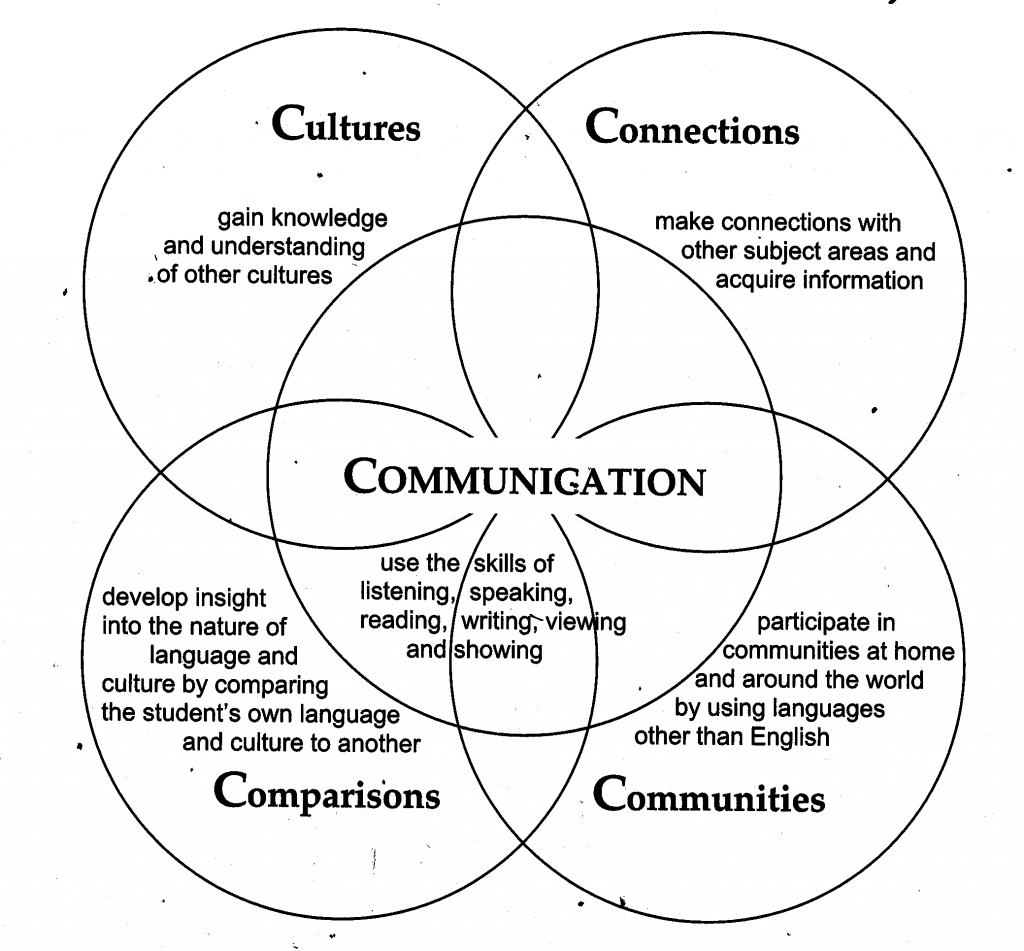Spanish Immersion
What is language immersion education?
The focus of the language immersion programs is to help students become proficient in the Spanish language while mastering subject content from other disciplines. Research shows the most effective way for children to acquire a second language is to integrate instruction into the standard curriculum children are already learning. Research also shows that immersion education students outperform students in traditional language classes, do as well as or better than non-immersion students on standardised tests, and have a greater appreciation of cultural diversity.
Why Spanish?
After English, Spanish is the fastest growing European language. Twenty-one countries have Spanish as their official language. Spanish ranks as the world’s number two language in terms of how many people speak it as their first language. This is slightly ahead of English (328 million). Wyndham Central College’s Spanish Immersion Program provides students with the deepest possible exposure to a second language and culture.
What does SIP look like?
In Year 7 students begin the course with up to 20% of the curriculum in the target language and this increases in Years 8, 9 and 10.
The Spanish Immersion program serves an environment where the target language is used exclusively. Content is delivered in the target language. The students become bilingual, bi-literate, and bicultural and are equally proficient in both languages with near-native fluency in the target language within 4 to 6 years approximately.
The percentages for each grade may be:
- 80% English and up to 20% Spanish in year 7.
- 70% English and up to 30% Spanish in year 8.
- 60% English and up to 40% Spanish in year 9.
- 50% English and up to 50% Spanish in year 10.
Which subjects are part of the SIP in 2020?
- Spanish
- Mathematics
- Science
- Humanities
- Music and Arts
If you are looking to enrol your child into the Spanish Immersion Program for 2020, fill in the attached application form and return it to Wyndham Central Secondary College. A member of the Language faculty will be in contact with you.
How does the SIP work?
Immersion students at Wyndham Central College experience the Spanish language while studying Mathematics, Science, Humanities, Music and Art from Year 7 to Year 10. During the Spanish language classes, students learn new vocabulary and grammar that will facilitate their understanding in the above-mentioned subjects.
The SIP provides a total language experience for students whose parents want the advantage of proficiency in English and exposure to a second language. Children learn the second language in a natural way, through everyday classroom conversational situations and through subject content instruction. SIP focuses on the 5C’s model.
Communication: Communicate in Languages other than English
This focuses on practical ability to use the Spanish language in the areas of speaking, listening, reading, and writing – rather than just knowing about the language. This is reinforced both formally and informally in our program.
Cultures: Gain Knowledge and Understanding of Other Cultures
Students are exposed to the local Latino practices and perspectives, and develop an understanding of the cultural norms by participating in them through the program. The school provides opportunities for the students go to excursions and overseas trips.
Connections: Connect with other Disciplines and Acquire Information
Aside from spending time in a classroom where they are taught fundamentals of the Spanish language, our students spend time engaging with the community and international students.
The focus of the community engagement element of our Spanish immersion program for our students is to experience the language and culture beyond the classroom.
Comparisons: Develop Insight into the Nature of the Language and Culture
Our WCC Spanish immersion participants each show a unique interest in the Latin culture and Spanish language. However, at WCC we are a diverse community and share the English language as a common ground. With our overseas trips, we place our students with friends/ buddies who naturally have different practices. Students tend to share their experiences with fellow Spanish students in English, and in comparison, share their experiences in Spanish with their host families and local high school friends.
Communities: Participate in Multilingual Communities at Home & Around the World
The foundation of our Spanish immersion program is getting students involved in local communities abroad – primarily through home-stays. However, our program is designed to help students bring their new insights and skills back to their home community and help them engage in new and different ways with English- and Spanish-speakers in their hometown.
One of the natural results of our Spanish immersion program is that students come home with an understanding of the advantages of being able to communicate in another language. They have grown in their confidence with speaking Spanish and have gained cultural understanding. The fact is that Latin culture is present in communities throughout Australia and countries around the world. Having experienced the culture and language on its own terms, students have gained a valuable insights and a skill set that many choose to further develop to benefit their future on a personal and professional level.
Goals of the SIP
- Second language exposure
- Cultural knowledge and understanding
- Subject matter achievement
- The development of thinking skills
- Strengthening English language skills
- Language learning for everyone
Benefits of the SIP
- Positive effect on intellectual growth
- Enrich and enhance a child’s mental development
- Leave students with more flexibility in thinking, greater sensitivity to language, and a better ear for listening
- Improve a child’s understanding of the English language
- Increase job opportunities in many careers where knowing another language is a real asset
What happens after completing the SIP?
Students are encouraged to continue further studies in the Spanish language by selecting Spanish at VCE as a subject from which their ATAR is then calculated. At VCE level there are further advantages of studying Spanish, in that, it is generally scaled up to recognize the complexity of the subject. They are also awarded automatic bonus points for entry into particular courses at The University of Melbourne, Monash University and Australian National University. This also leads in the preparation for university and workforce in many careers where knowing another language is an asset for further progression into their careers.
How does the admissions and application process work?
Parents and their child go through the standard Wyndham Central Secondary College registration process. This is followed by the application process with the Language faculty, which includes an expression of interest, SIP assignment, interview with the Language Immersion Leader, primary school teacher’s recommendation and a satisfactory outcome in a literacy and numeracy test during orientation. To ensure your child is accepted in the program, make sure to register as early as possible. Some applicants will be offered the opportunity to enrol; other applicants will be placed on a wait list. After the close of the enrolment period, the school will continue to accept applications for all grades. If there are no spaces available in a specific grade in the SIP, the prospective student will be placed on a waiting list.
What is the selection criteria to be accepted in the SIP?
There are two ways to enter the Spanish Immersion program:
- Students currently in grade six may apply directly into the SIP by completing an assignment followed by an interview and primary school teacher recommendations. This occurs from March to September every year.
- Students in Year 7 may apply to enter the SIP in year 8 by sitting the Spanish Immersion exam and passing an interview together with teacher recommendations. This occurs from June to September every year.
Parents and students attend an interview conducted by a small panel from the Language faculty. Students and parents are asked a series of questions of general knowledge in the Spanish world and reasons for wanting to be part of the SIP.
Primary school teachers are then given the opportunity to give recommendations for the students that have applied for the SIP. Primary school teachers fill in an information pack that has a list of questions that gives Wyndham Central College more information to determine if a student is suitable for the program.
Students and parents must pass all the selection criteria. Successful applicants are notified by telephone and an acceptance letter is then sent to their home address.
Mid way through year 7 the Spanish Immersion class completes an exam, there is a requirement that your child passes the exam to stay in the program for the next three years.
My child will be in year 7 next year. Can he/ she join the SIP?
Wyndham Central College may admit new students into the SIP assessed on Spanish language proficiency and English literacy and Numeracy skills. Otherwise, new students are not admitted beyond the first term of year 7. The Language Immersion and Internationalism leader will determine suitability to join the program and to ensure that the late addition will not have a negative impact in the learning of the rest of the class.
Is the SIP only for high performing students?
Research shows that immersion education can be effective for a wide variety of learners, including academically/intellectually gifted students, non-native English speakers, students with many special education needs and socio-economic challenges.
What languages can my child learn?
Wyndham Central Secondary College offers Spanish and Japanese.
What if my child doesn’t respond well to the SIP?
Like any other child, your child will be tired at the end of the school day. It is tough work to play hard and stick to all those school rules. It is even more exhausting when you are processing a new language. So don’t be surprised if your child is tired and cranky after school. If you are worried your child is not enjoying school or thriving in the immersion environment, talk to your teacher and the Language Immersion Leader. Most students respond well to joining an immersion program they are made to feel secure right from the start and, after a few days, they do not focus on the fact that the teacher is not speaking English. Parents should wait at least a year, to see if their child responds better after just getting through the transition from Primary to Secondary school.
Furthermore, if a child is not completing class work and homework, their teacher will notify you so that strategies can be put in place to better your child’s outcomes.
Will my child be able to speak English in class until they learn enough vocabulary to communicate?
At Wyndham Central College, you will often hear children speaking or responding to teachers in English. However, their teachers will be speaking to them in both Spanish and English, using a lot of gestures and props to convey the messages. SIP teachers will encourage new language learners to respond in the target language by giving them the needed vocabulary to mimic
Will my child take state mandated assessment, like the NAPLAN, in the foreign language?
No. All state mandated assessments, like the NAPLAN, will be taken in English.
If my child is in the SIP, how will they learn the English skills they need to be successful on NAPLAN and other assessments in English?
Your child will get all subject content instructions in English. In years 7 to 8, immersion students receive one 72-minute session of Spanish per week. This time increases to two 72 minutes in year 9 and 10. Literacy skills & patterns learned in one language will help the development of skills in another language.
I do not speak another language so I will not be able to help my child at home.
The most important thing you can do at home is read to your child in English. Reading in any language supports the acquisition of reading skills such as fluency, vocabulary building, comprehension, etc. Your child’s homework should support what they have learned in class. Students should be able to tackle the assignment on their own. Parents will be able to identify what skill is being addressed and support their child’s learning in the skill, even if you can only help in English. Homework should not be a struggle! If it is, please talk with your child’s teacher. The good news: You don’t have to know the language to support your child at home.
What else can I do to help in the SIP?
There is a lot you can do. Be a strong parent advocate. Start an immersion parent group to support each other, educate each other, share successes and challenges and ideas to make the program outstanding at your school. Recruit for your school. Spread the word. Tell all your friends what you know about the program. Post it on your Facebook wall. It will be important for the health of the program at your child’s school to maintain healthy numbers in the immersion classrooms.
Will there be a trip to Spain?
Yes, Wyndham Central college has a sister school partnership with Gredos San Diego in Madrid Spain. There is a trip to Spain in September 2020. This trip occurs every year and students have the opportunity to apply early in the year.
How do I contact the Language Faculty, if I have further questions?
The best form of communication is via email. Contact Mr. De-Leon:
de-leon.alex.a@edumail.vic.gov.au
All phone enquiries, contact the school on 9741 4911.
We welcome and look forward to you and your child becoming involved in the many varied aspects of the SIP provided by the Wyndham Central College Languages faculty. Spanish staff are always available to talk about your child’s progress and answer any questions or concerns you may have. Looking forward to a successful 2020!
Application process
Review the cover letter in the Downloads section at the bottom of this page, then click the following link to access the application form in your web browser: https://forms.office.com/r/m9T1vmad3e
Alternatively, there is a PDF version of the form available in the Downloads section which you can print and return to the school.















